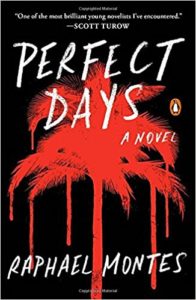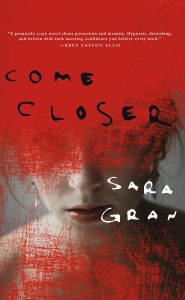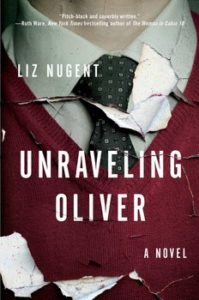Some books have narrators who are likeable, kind, and good-hearted. Others have narrators who are in the grey area. They are flawed and make questionable choices, but ultimately they’re more good than bad.
Then there are the narrators who are psychopathic, morally bankrupt, even downright despicable. But something about them keeps people reading. These narrators can be charming or funny or just so compelling they keep readers turning the pages. Pulling off a character like this takes a certain skill—and a certain kind of brain. Patricia Highsmith, Gillian Flynn, and Caroline Kepnes have all done it brilliantly. Here’s a list of even more books with those horrible, yet mesmerizing, narrators:
Tampa by Alissa Nutting
Where to start with Celeste? She’s a teacher who is attracted to teenage boys. And yes, you bet she acts on it. How many times have you read this story the other way, with an older male teacher preying on young girls? Exactly. That’s the point. Alissa Nutting has written a brilliant satirical book with a narrator you may hate but it’s impossible to turn away. Explicit, raw, and so very good.
Best Day Ever by Kaira Rouda
What’s better than getting away to the lake for a while? A long drive, fresh air, beautiful scenery, a psychopathic husband…Yes, that’s right. Kaira Rouda takes “marital strife” to new heights in this book, and you get to experience everything in Paul’s head. Twisted, fascinating, and brilliant.
The Wasp Factory by Iain Banks
Sixteen-year-old Frank lives on an island with his father and has an older brother in a psychiatric hospital. Frank spends his days going through a strange set of rituals, none of which make sense in this isolated, odd world he inhabits. The first clue he isn’t right comes when he kills small animals. What comes later will blow your mind.

Perfect Days by Raphael Montes
Brazilian author Raphael Montes created a character named Teo, and he’s almost impossible to hate—even when he’s doing very bad things. Horrible things. But you see, Teo and Clarice belong together. He believes this down to the pit of his broken, stone cold heart. And you know what? I almost believed it, too.
Come Closer by Sara Gran
Easily the most frightening book on this list. Amanda is a successful architect who has a great marriage, a new loft in Manhattan…and a voice in her head telling her to do very bad things. Oh, and she has blackouts. Is she mentally ill, a psychopath, or has she been possessed by a demon? Read it and find out.
Unraveling Oliver by Liz Nugent
Oliver is a children’s book author who leads what appears to be a normal life, until one day he snaps and attacks his wife. Did he have a momentary lapse in sanity? Or was it always in him? A number of narrators answer this question, including Oliver himself, and they’ll take you all the way down the rabbit hole.
The Good Son by Yu-Jeong Jeong
Yu-jin wakes up to find himself covered in blood and it’s not his. The blood belongs to his mother, who has been murdered. He also has epilepsy, and the seizures cause memory blackouts. Over the course of the three days, Yu-jin tries to find out what happened and, at the same time, reveals his relationship with his mother. Fair warning: This disturbing, claustrophobic story is graphic and violent.
The Dinner by Herman Koch
What’s more normal than two couples having dinner in a nice restaurant? How about two couples discussing a murder their sons were involved in? Paul tells the story throughout the meal, and it doesn’t take long to figure out that the kids aren’t the worst ones in this story.
American Psycho by Bret Easton Ellis
This was polarizing when it came out and it still is. Patrick Bateman is the pinnacle of the Greed is Good eighties: He’s a rich, white investment banker on Wall Street. Oh, and a serial killer. As gory as this book is (and it’s shockingly graphic) it’s also funny. This novel is satire, a commentary on what happens to people whose lives revolve around status and money.
Lolita by Vladimir Nabokov
In an article about loathsome narrators, this book is impossible to avoid. Humbert tells the story of his obsession with a young girl, a book often called one of the best ever written. It does leave one question unanswered: Does Humbert believe he’s telling the truth? Or is he knowingly trying to manipulate the reader into feeling sorry for him? You decide.
*






























